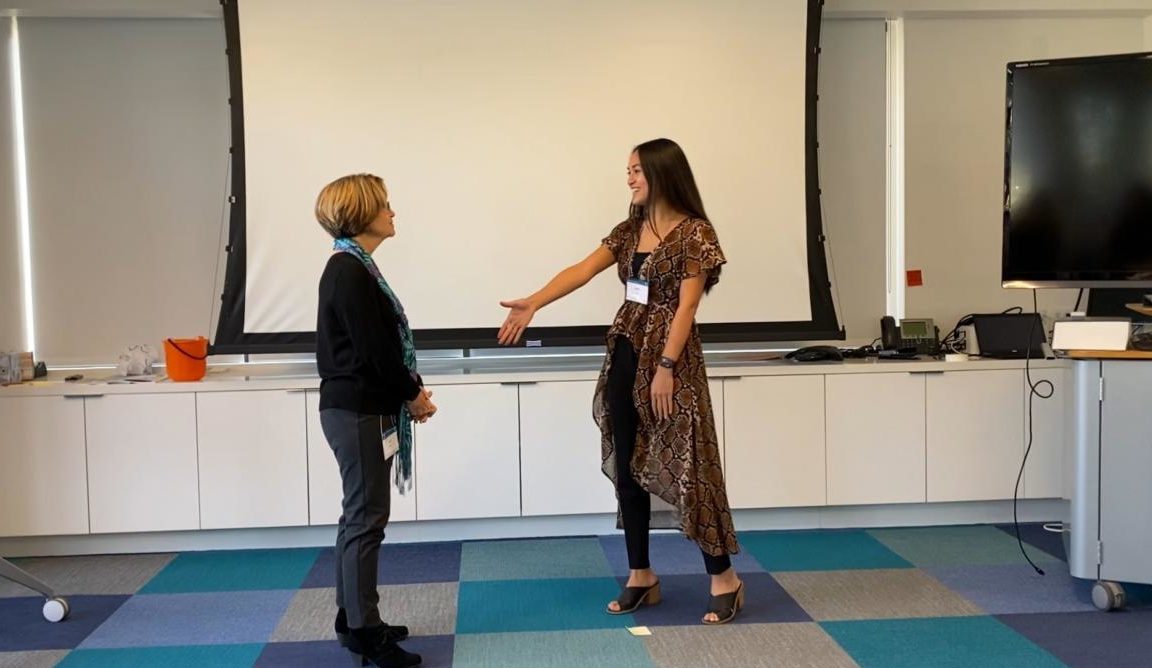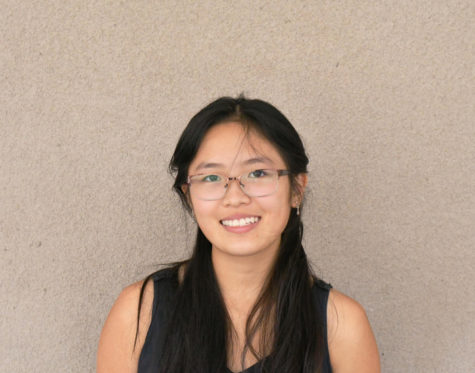Tran explores industrial-organizational psychology
December 17, 2021

With wide eyes, Amy Tran sat at her desk staring up at Freud’s five psychosexual stages of development written on the whiteboard at the front of the classroom. She took dutiful notes as social science teacher Chris Fousek lectured—nothing she learned in school had ever gripped her attention so strongly.
These days, the majority of her responsibilities are those of an industrial-organizational psychologist—Tran’s work involves figuring out the strengths and weaknesses of the client companies she is assigned. Traditional IO psychologists apply psychological principles and research methods to improve an overall work environment, and Tran does this every day as a part of her job.
Since the pandemic hit, Tran has been working from home. Despite the circumstances of COVID-19, she maintains a well-focused purpose to her work. Each day, from her personal desk, she spends her time working as a senior research analyst at the Center for Creative Leadership, a company that consults on issues of employee productivity and wellness.
On the side, she also consults as an IO psychologist, working with companies to develop more positive environments for their employees. The work for both jobs is hard, but rewarding—Tran said she relishes the feeling of making a difference, of being able to make a tangible change to the operations of the organizations she works with.
“I love talking to my coworkers and clients, throughout the day,” Tran said. “The work is hard and very rewarding, but my favorite part each day is that it feels like I’m going to work with friends instead of just co-workers because we all have the same vision in mind, which is to help people through psychology.”
As a people-oriented individual, Tran’s motivation to work in psychology, in part, stems from her own personality, which is more relationship-focused than task-focused.
“A lot of my career and academic journey has been driven by my personality,” Tran said. “I’m definitely a people person, and I’m definitely the kind of person to say yes to a lot of opportunities. My co-workers would describe me as someone who makes work fun. I believe in levity, so that we can all enjoy our work.”
Another large part of what drove Tran to major in IO psychology in the first place was the fact that it can be helpful in the workplace. The human impact of her work is something she finds fulfilling.
However, this wasn’t always her idea of what [helping people] looked like. As a high-school junior, freshly transferred from Scripps Ranch, Tran wanted to be a pediatrician.
“I was totally ready — I had five- and fifteen-year plans to become a pediatrician,” she said.
As a part of this goal, Tran had faced enormous academic challenges—the junior year she transferred from Scripps Ranch to Westview, she had pushed herself from a schedule of no APs to five APs. The change only contributed to the stress she felt in a new environment, and at times, she said, she felt herself becoming overwhelmed by everything she was trying to balance.
“I think most people recognize that Westview is a very competitive high school,” Tran said. “You have the ability to be very challenged if you want to. But I struggled at Westview because I didn’t know how to keep up, and it was very easy to compare myself to others and think I wasn’t good enough.”
Throughout this all, however, Tran maintained her career aspirations. At the time, it felt like being a pediatrician was a perfect fit for her, she said. It fit her parents’ idea of a successful job, and it was a position from which she could make a meaningful difference for others.
Yet that all changed only a month into the AP Psychology class she took with Fousek. It was the first time Westview had ever offered the course, but Tran was immediately hooked. Once she took the class, the plans she had in place for so long lost their hold. Psychology spoke to her in a way that medicine never did. iIt felt like coming home, she said.
“Once I took that psychology class, I said ‘I’m going to change everything because this is exactly what I like,’” Tran said. “I didn’t just want to heal people and help them deal with physical issues, I wanted to get to the root of behaviors and study why humans behave in the ways that they do.”
A general focus on psychology, however, was not a concrete enough aspiration for someone who was as detail-oriented as Tran. She soon began looking into the various jobs within the actual field of psych, some of which she ruled out due to monetary concerns.
“Money was always a big factor in my decision-making,” she said. “I knew that I wanted a career that paid well, and I knew that going to school and getting my degrees needed to be good financial decisions.”
Having narrowed down her criteria, she eventually settled upon two different careers, both of which seemed like interesting, engaging jobs.
“In the back of the textbook, there’s a list of all the different types of psychology that you can specialize in,” Tran said. “Like school, counseling, forensic, etc. For me, I was most interested in forensic psychology and IO psychology.”
Even after she figured out what she actually wanted to study, Tran still faced certain obstacles, chief of which were her parents’ disapproval of any jobs that weren’t considered traditionally high-prestige, and getting into college so that she could continue her education.
“There was definitely some pushback from my parents,” Tran said. “They didn’t know anyone who was a psychologist, and since I’d wanted to be a pediatrician for so long, they weren’t as supportive of me wanting to study psych.”
Tran eventually managed to convince her parents of the opportunities within her new field of interest, though not without copious amounts of research and cajoling. At the same time, she was also in the middle of the college-application process. This too, was stressful for Tran, especially because of Westview’s culture of academic pressure.
“I focused pretty hard on getting into college, and it was so not worth it,” Tran said. “I spent way too many hours online searching up colleges, when no one really cares about what you do or where you go for your undergraduate, especially if you go to graduate school.”
Ultimately, Tran ended up attending Cal State San Marcos for her undergraduate degree in general psychology. The rigor of her junior and senior years at Westview was not without its benefits—her time at CSUSM was significantly easier because she had grown so used to difficult classes.
“Honestly, I would say that Westview prepared me really well for college because it was so hard that undergrad seemed almost easy,” Tran said.
At the same time, the ease of studying encouraged her personal growth, and Tran found herself becoming more and more confident in her passion for psychology as she was given the room to explore her own interests.
“I think I grew the most when I went to college,” Tran said. “Because that was when I was doing what I really loved, and studying what I cared about. In high school, you don’t have that much control over how you study and how you get to learn. In college, you get to make your own decisions, and that really helped me.”
After undergrad, however, came the challenge of grad school, a significantly higher-stakes moment for Tran, because of its significance upon her future career.
“Grad school is a much bigger decision to make than undergrad, in my field, so that was a lot more difficult to manage,” Tran said.
Her laser focus on helping people through psychology, however, propelled her to San Diego State, where she earned a graduate degree in IO psychology. Even now, as a full-fledged industry professional, being able to help people is what Tran finds the most fulfilling.
“I think parts of IO psych really embody why psychology drew me in in the first place, ecause it studies behavior and the way it comes from the way we think and the way we act,” Tran said. “I wanted to use psychology, instead of medicine, to help people, and that’s really what I’ve been able to do.”


